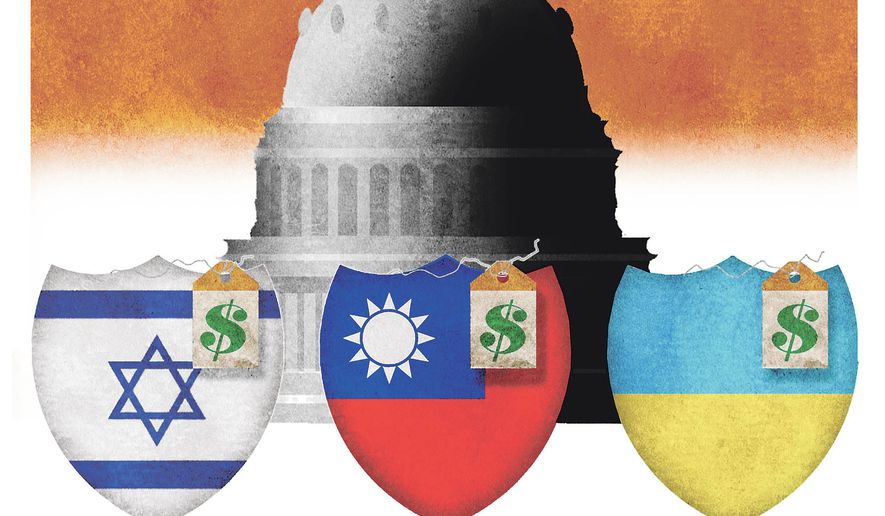OPINION:
Congress faces a decision that will have historic, global consequences.
The Senate’s $95 billion funding measure covering Israel, Ukraine and Taiwan has languished in the House for two months. The White House continues to insist on one omnibus-like funding measure — a complete nonstarter with House Republicans.
Speaker Mike Johnson’s decision to separate the three initiatives and introduce a fourth bill to address other funding-related matters is the best and only way forward.
The easy way out for the Louisiana Republican would have been to defer to those who refuse to support further funding abroad without first fixing the gaping wound of unchecked immigration festering on our southern border. And we get it: With the U.S. national debt at nearly $35 trillion and an immigration crisis on our own border, expecting the House to spend billions more overseas is a big ask.
But with Iran’s unprecedented attack on Israel and the increasingly dire situation in Ukraine, linking their funding to the border is no longer viable.
My CityServe colleagues and I — representing thousands of churches at home and abroad — provide faith-based, humanitarian relief to Ukraine and Israel. We have witnessed their needs firsthand.
Uri Steinberg, director of CityServe Israel, was with his family in Tel Aviv when his phone lit up with the news that a barrage of missiles and drones was headed their way from Iran.
“There is something very eerie and quite terrifying about the thought that hundreds of missiles and drones are headed your way,” he tells us.
Fortunately, we now know 99% of the ordnance was intercepted. With tensions rapidly rising in the Middle East and across the globe, however, it is clear the United States cannot afford to watch from the bleachers.
“This is not just a Middle Eastern conflict,” Mr. Steinberg cautions. “Russians are involved, the United States is involved, and others.
“What’s happening here is playing out on an international stage. There will be repercussions across the entire world,” he says.
That suggests U.S. leaders must understand the moment. Since the end of the Cold War, the rules-based global order has never faced a challenge like the one now playing out before our eyes in Ukraine, Israel and beyond.
If U.S. leaders can’t overcome their own political infighting to provide proper funding to our allies, it will send a terrible, destabilizing message to the world. That makes this an especially bad time for political brinkmanship on Capitol Hill, and a simple thought experiment will prove it.
Let’s say tomorrow, President Xi Jinping and the Chinese Communist Party decide the time has arrived to open yet another theater of war by invading Taiwan.
In that scenario, would anyone think of stonewalling funding for the sake of the border? Of course not: Americans would immediately see that our most important alliances and principles were under attack.
Mr. Johnson understands the urgency, and that’s why he’s bringing the measures to the floor individually. Lawmakers can get on the record, offer amendments, and vote their consciences. But make no mistake: The world is watching to see whether the United States has enough political unity to respond to raging conflicts abroad. And foremost among these keen observers is China.
The bottom line: What initially seemed expedient in the Senate — lumping everything into a single bill — is a nonstarter in the House. That means Mr. Johnson is leading the only practical way forward. We applaud him for doing so.
Before one more Ukrainian child dies in a Russian assault, before Israelis face one more missile attack, and before matters spin totally out of control in the East and South China seas, Congress must take an up-or-down vote on these separate funding bills.
For any chance of preserving a peaceful future for our children, Congress must act now.
• Dave Donaldson is co-founder and CEO of CityServe.us and CityServe International.




Please read our comment policy before commenting.